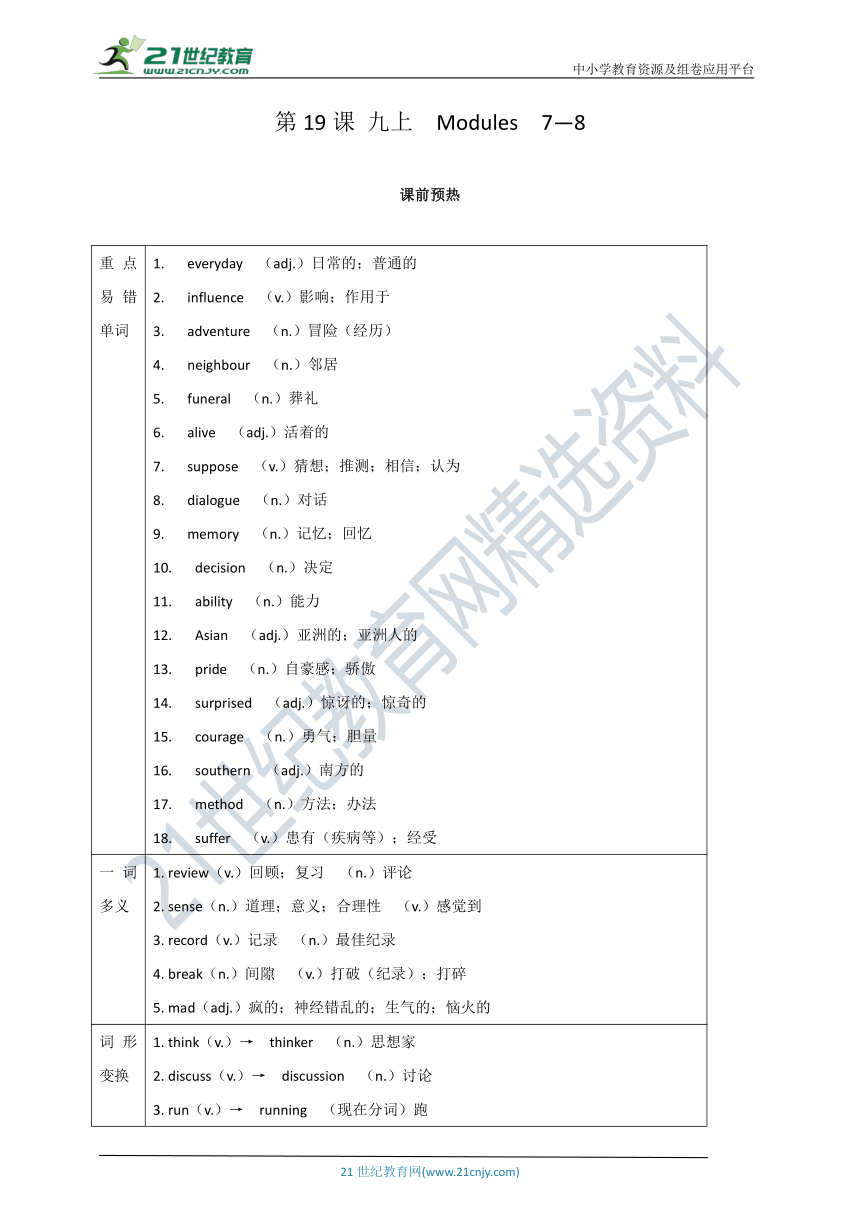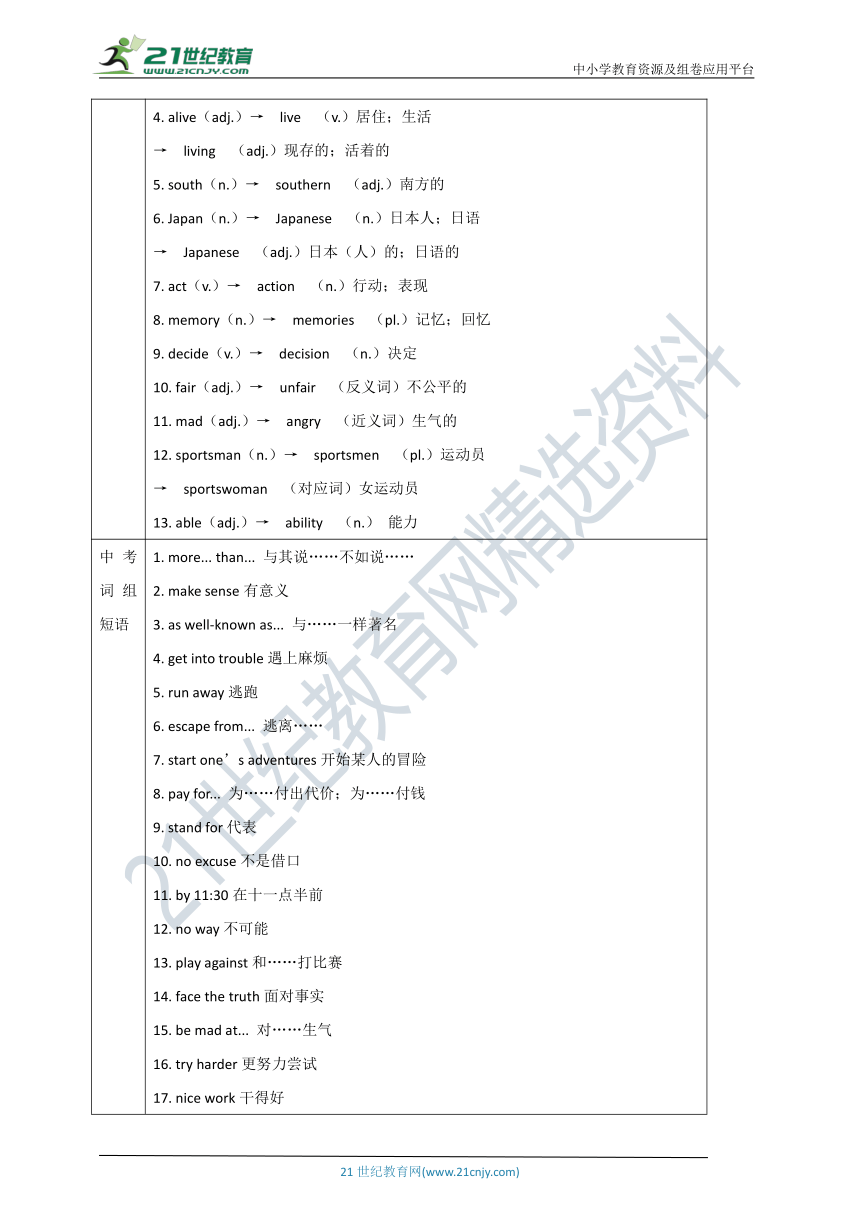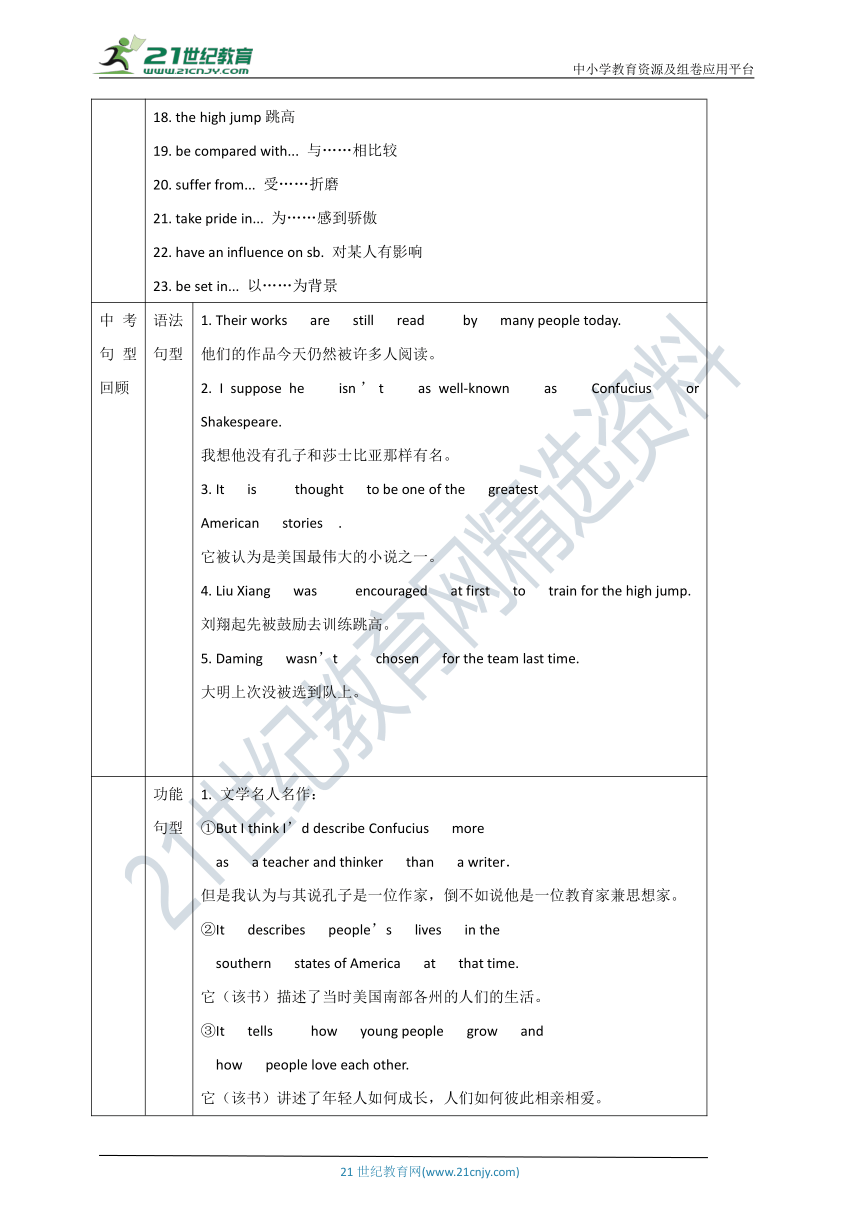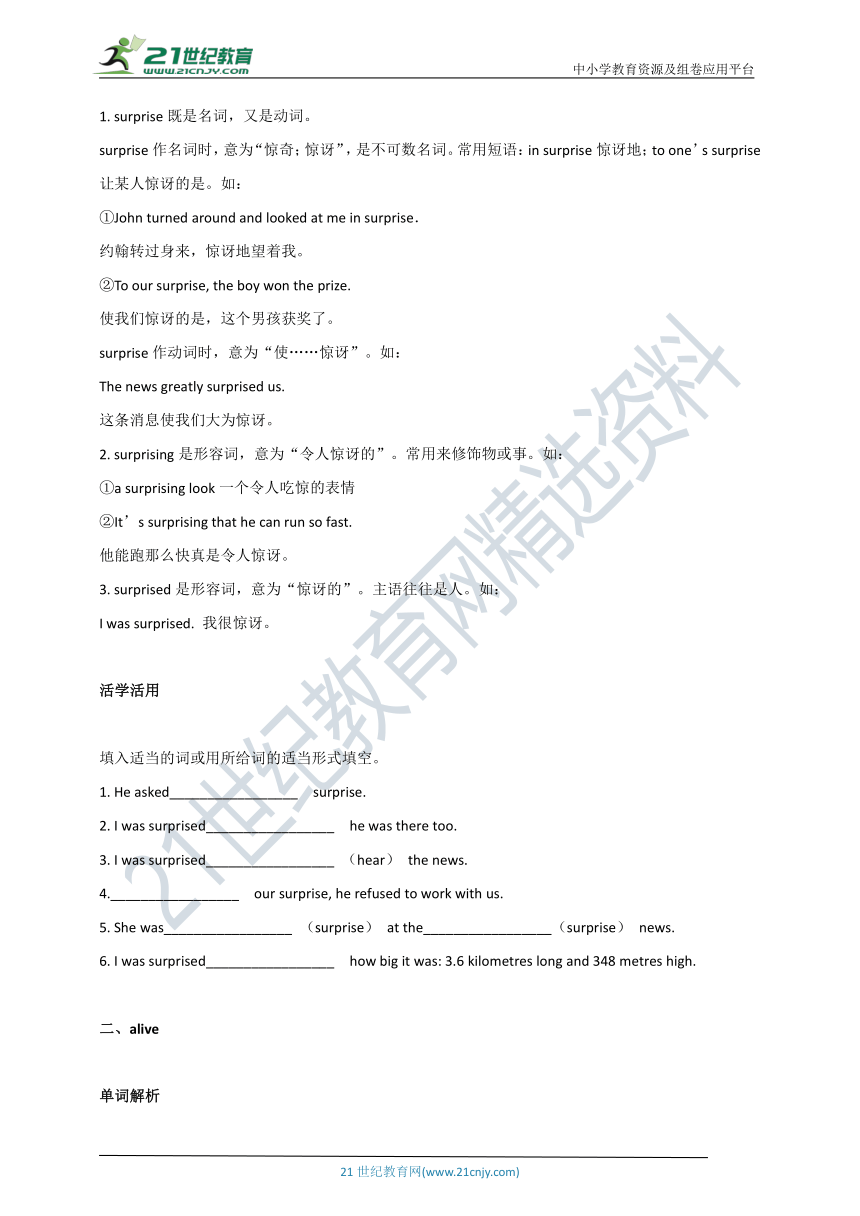外研版英语中考语言基础知识梳理与训练 第19课九年级上册 Modules 7—8
文档属性
| 名称 | 外研版英语中考语言基础知识梳理与训练 第19课九年级上册 Modules 7—8 |

|
|
| 格式 | doc | ||
| 文件大小 | 1.3MB | ||
| 资源类型 | 试卷 | ||
| 版本资源 | 外研版 | ||
| 科目 | 英语 | ||
| 更新时间 | 2022-02-06 19:19:05 | ||
图片预览





文档简介
中小学教育资源及组卷应用平台
第19课 九上 Modules 7—8
课前预热
重点易错单词 1. everyday (adj.)日常的;普通的2. influence (v.)影响;作用于3. adventure (n.)冒险(经历)4. neighbour (n.)邻居5. funeral (n.)葬礼6. alive (adj.)活着的7. suppose (v.)猜想;推测;相信;认为8. dialogue (n.)对话9. memory (n.)记忆;回忆10. decision (n.)决定11. ability (n.)能力12. Asian (adj.)亚洲的;亚洲人的13. pride (n.)自豪感;骄傲14. surprised (adj.)惊讶的;惊奇的15. courage (n.)勇气;胆量16. southern (adj.)南方的17. method (n.)方法;办法18. suffer (v.)患有(疾病等);经受
一词多义 1. review(v.)回顾;复习 (n.)评论2. sense(n.)道理;意义;合理性 (v.)感觉到3. record(v.)记录 (n.)最佳纪录4. break(n.)间隙 (v.)打破(纪录);打碎5. mad(adj.)疯的;神经错乱的;生气的;恼火的
词形变换 1. think(v.)→ thinker (n.)思想家2. discuss(v.)→ discussion (n.)讨论3. run(v.)→ running (现在分词)跑4. alive(adj.)→ live (v.)居住;生活→ living (adj.)现存的;活着的5. south(n.)→ southern (adj.)南方的6. Japan(n.)→ Japanese (n.)日本人;日语→ Japanese (adj.)日本(人)的;日语的7. act(v.)→ action (n.)行动;表现8. memory(n.)→ memories (pl.)记忆;回忆9. decide(v.)→ decision (n.)决定10. fair(adj.)→ unfair (反义词)不公平的11. mad(adj.)→ angry (近义词)生气的12. sportsman(n.)→ sportsmen (pl.)运动员→ sportswoman (对应词)女运动员13. able(adj.)→ ability (n.) 能力
中考词组短语 1. more... than... 与其说……不如说……2. make sense有意义3. as well-known as... 与……一样著名4. get into trouble遇上麻烦5. run away逃跑6. escape from... 逃离……7. start one’s adventures开始某人的冒险8. pay for... 为……付出代价;为……付钱9. stand for代表10. no excuse不是借口11. by 11:30在十一点半前12. no way不可能13. play against和……打比赛14. face the truth面对事实15. be mad at... 对……生气16. try harder更努力尝试17. nice work干得好18. the high jump跳高19. be compared with... 与……相比较20. suffer from... 受……折磨21. take pride in... 为……感到骄傲22. have an influence on sb. 对某人有影响23. be set in... 以……为背景
中考句型回顾 语法句型 1. Their works are still read by many people today. 他们的作品今天仍然被许多人阅读。2. I suppose he isn’t as well-known as Confucius or Shakespeare.我想他没有孔子和莎士比亚那样有名。3. It is thought to be one of the greatest American stories .它被认为是美国最伟大的小说之一。4. Liu Xiang was encouraged at first to train for the high jump.刘翔起先被鼓励去训练跳高。5. Daming wasn’t chosen for the team last time.大明上次没被选到队上。
功能句型 1. 文学名人名作:①But I think I’d describe Confucius more as a teacher and thinker than a writer.但是我认为与其说孔子是一位作家,倒不如说他是一位教育家兼思想家。②It describes people’s lives in the southern states of America at that time.它(该书)描述了当时美国南部各州的人们的生活。③It tells how young people grow and how people love each other.它(该书)讲述了年轻人如何成长,人们如何彼此相亲相爱。④It is more than an adventure story.它不仅仅是一部冒险小说。2. 运动员:①It is a pity that his foot problem stopped him from completing the 2012 London Olympic Games.真可惜,脚伤阻止了他完成2012年的伦敦奥运会。② From 2008 on, he suffered a lot from his foot problem, but he did not give up .从2008年开始,由于他的脚伤,他遭受了许多痛苦,但是他没有放弃。③But he is still a symbol of courage and success , and we continue to takegreat pride in him.但他仍然是勇气和成功的象征,我们一如既往地以他为骄傲。
课堂突破
中考重点词汇精析
一、surprised
单词解析
adj. 惊奇的;惊讶的;觉得奇怪的;感觉意外的。如:
She looked surprised when I told her.
我告诉她时她显得很惊讶。
常用搭配:be surprised to do sth. 做某事很惊讶;be surprised at对……感到惊讶;be surprised+that从句:因……而惊讶。
辨异突破
surprise, surprising与surprised
1. surprise既是名词,又是动词。
surprise作名词时,意为“惊奇;惊讶”,是不可数名词。常用短语:in surprise惊讶地;to one’s surprise让某人惊讶的是。如:
①John turned around and looked at me in surprise.
约翰转过身来,惊讶地望着我。
②To our surprise, the boy won the prize.
使我们惊讶的是,这个男孩获奖了。
surprise作动词时,意为“使……惊讶”。如:
The news greatly surprised us.
这条消息使我们大为惊讶。
2. surprising是形容词,意为“令人惊讶的”。常用来修饰物或事。如:
①a surprising look一个令人吃惊的表情
②It’s surprising that he can run so fast.
他能跑那么快真是令人惊讶。
3. surprised是形容词,意为“惊讶的”。主语往往是人。如:
I was surprised. 我很惊讶。
活学活用
填入适当的词或用所给词的适当形式填空。
1. He asked_________________ surprise.
2. I was surprised_________________ he was there too.
3. I was surprised_________________ (hear) the news.
4._________________ our surprise, he refused to work with us.
5. She was_________________ (surprise) at the_________________(surprise) news.
6. I was surprised_________________ how big it was: 3.6 kilometres long and 348 metres high.
二、alive
单词解析
adj. 活着的。如:
We don’t know whether he’s alive or dead.
我们不知道他是死是活。
辨异突破
live, alive, living与lively
四者作形容词时,都与“活”有关。区别在于:
1. alive多用于修饰人或动物,反义词为dead,无比较级,意为“活的;充满活力的”,可以作表语、后置定语或者宾语补足语。如:
①He is lucky to be alive after the earthquake.
他很幸运,地震后还活着。
②Doing exercise can keep your brain alive. 做运动能使你的头脑保持活跃。
2. live作形容词时,读作/laIv/,只用于修饰动物或植物,作前置定语,意为“活的;有生命的”。另外live还可意为“实况转播的;现场直播的”。如:
①You can meet live animals—giraffes, pandas, tigers, and so on.
你能够遇到活生生的动物——长颈鹿、大熊猫、老虎等。
②a live report现场报道
3. living可以指人或物,说明某一时候是活着的,可作前置定语或表语,意为“活的;活着的;健在的”,作表语时用法与alive相近,其反义词也是dead。如:
Water is very important for living things.
水对生物非常重要。
4. lively则是表示“充满生气的;精力充沛的;生动的;活泼的”。如:
Mary is a lively girl and she often makes friends with others.
玛丽是一个活泼的女孩,经常和他人交朋友。
活学活用
用所给词的适当形式填空。
1. Her eyes are bright and_________________ (live).
2. Mary is a confident and_________________ (live) girl.
3. Luckily, he is still_________________ (live) after the serious illness.
三、maybe
单词解析
adv. (不确定)大概,或许,可能;(提出建议)或许,也许;(赞同并补充信息)或许。如:
It will cost two, maybe three hundred pounds.
这个要花二百英镑,或许三百英镑。
辨异突破
maybe与may be
maybe和may be一合一分,它们的含义和用法也不同。
1. maybe是副词,意为“也许;可能”,在句中作状语,相当于perhaps,常位于句首。如:
Maybe you put the letter in your pocket.
大概你把信放在衣袋里了。
2. 在may be中,may是情态动词,be是动词原形,两者构成完整的谓语形式,与表语构成系表结构,意为“也许是;可能是”。如:
I can’t find my watch. It may be in your pocket.
我找不到我的手表了,它可能在你的口袋里。
3. maybe和may be可相互转换。如:
①He may be in the office. =Maybe he is in the office. 他或许在办公室。
②You may be right. =Maybe you are right.
你或许是对的。
单词解析
用maybe或may be填空。
1._________________ you’ll have better luck next time.
2. She_________________ a nurse.
3._________________ he will go to hospital.
4. He has been ill for 3 days. He_________________ fine now.
5. He has been ill for 3 days._________________ he is fine now.
6. Tom_________________ at home.
7. —Is it true
—_________________, I am not sure.
8._________________ he has lost his way.
中考重点句型精析
It is still read and loved by people.
它今天仍然被人们阅读和喜爱着。
句型解析
这是一般现在时的被动语态形式。
英语中如果强调动作的承受者并把它作为主语放在句首,而把动作的执行者放在句末且用by连接或忽略,这样的结构被称为被动语态。
一般现在时的被动语态的用法如下表:
句式 句子构成 例句
肯定句 主语+系动词is/am/are+动词的过去分词. We’re influenced by his thoughts.
否定句 主语+系动词is/am/are+not+动词的过去分词. He isn’t known as a great thinker like Con-fucius.
一般疑问句 系动词Is/Am/Are+主语+动词的过去分词 —Are Confucius’s works read by people today —Yes, they are.
特殊疑问句 特殊疑问词+系动词is/am/are+主语+动词的过去分词 What is it called
活学活用
填入适当的词或用所给词的适当形式填空。
1. Our English teacher_________________ (love) by all of us because she always makes her class interesting.
2. —_________________ Mark Twain’s books still_______________(read) by people all over the world
—Yes, they_________________ .
3. What_________________ you_________________ (ask) to do
4. The book_________________ (not write) in English.
5. Something must_________________ (do) to help the homeless children.
当堂检测
一、选词填空
用方框中所给词语的适当形式填空。每词限用一次。
escape maybe act south take pride in
1. My parents always_________________ everything good I do.
2. It’s known to everyone that_________________ speak louder than words.
3. They went to the hills to_________________ the summer heat.
4. A snowstorm is going to reach_________________ areas by Monday.
5._________________ I can ride the bicycle and follow you.
二、单词拼写
1. The final_________________ (决定) depends on you.
2. There is no reason to_________________ (推断) she’s lying.
3. Have you_________________ (讨论) the problem with anyone
4. Doctors kept the baby_________________ (活着的) for six weeks.
5. The Internet has become part of_________________ (日常的) life.
6. She was_________________ (惊讶的) that no one was there to greet her.
7. They do not have the_________________ (勇气) to apologise for their actions.
8. We became the best friends and I was_________________(影响) by him deeply.
9. Many companies are_________________ (经受) from a shortage of skilled workers.
10. Her brother died on Christmas Eve and the festival always makes her think of her_________________(去世的) brother.
三、语法填空
阅读下面短文,在空白处填入一个适当的词,或填入括号中所给单词的正确形式。
The mountain was high and it was cold. Everything 1_________________(cover) by snow and ice and it was dangerous. I shook in my tent as the storm tried 2_________________(knock) me back to the bottom. “You will never make it to the top,” everyone said. “No woman has ever climbed this mountain and only a few people have done it by themselves.” I was so confident 3_________________ I would be the first woman to climb up to the top of Whitmore. I had prepared for several 4_________________(month).
The wind had gotten much 5_________________(quiet) when I woke up the next morning. I climbed 6_________________ of my tent and looked out at the mountain. Everything was white and still. “I will make it to the top today,” I thought to 7_________________(I).
I started up the slope. My feet crunched the snow with every step I took. It was a beautiful day. I was climbing quickly. Soon I was going to reach the top. All of 8_________________ sudden, I slipped(滑倒). I moved down the mountain. I was going slowly at first but then I started to slide very fast. I started to turn around and around quickly. After what felt 9_________________ forever, I came to a stop. I had slid all the way to the bottom. I was alive. I couldn’t believe it.
Three days later, I 10_________________(make) it to the top. It was a beautiful day and I had a perfect view of everything around me.
参考答案
第19课 九上 Modules 7—8
课堂突破
【中考重点词汇精析】
一、1. in 2. that 3. to hear 4. To 5. surprised, surprising
6. at
二、1. lively 2. lively 3. alive
三、1. Maybe 2. may be 3. Maybe 4. may be 5. Maybe
6. may be 7. Maybe 8. Maybe
【中考重点句型精析】
1. is loved 2. Are, read, are 3. are, asked 4. isn’t written
5. be done
当堂检测
一、1. take pride in 2. actions 3. escape 4. southern
5. Maybe
二、1. decision 2. suppose 3. discussed 4. alive
5. daily/everyday 6. surprised 7. courage 8. influenced
9. suffering 10. dead
三、1. was covered 2. to knock 3. that 4. months 5. quieter
6. out 7. myself 8. a 9. like 10. made
21世纪教育网 www.21cnjy.com 精品试卷·第 2 页 (共 2 页)
HYPERLINK "http://21世纪教育网(www.21cnjy.com)
" 21世纪教育网(www.21cnjy.com)
第19课 九上 Modules 7—8
课前预热
重点易错单词 1. everyday (adj.)日常的;普通的2. influence (v.)影响;作用于3. adventure (n.)冒险(经历)4. neighbour (n.)邻居5. funeral (n.)葬礼6. alive (adj.)活着的7. suppose (v.)猜想;推测;相信;认为8. dialogue (n.)对话9. memory (n.)记忆;回忆10. decision (n.)决定11. ability (n.)能力12. Asian (adj.)亚洲的;亚洲人的13. pride (n.)自豪感;骄傲14. surprised (adj.)惊讶的;惊奇的15. courage (n.)勇气;胆量16. southern (adj.)南方的17. method (n.)方法;办法18. suffer (v.)患有(疾病等);经受
一词多义 1. review(v.)回顾;复习 (n.)评论2. sense(n.)道理;意义;合理性 (v.)感觉到3. record(v.)记录 (n.)最佳纪录4. break(n.)间隙 (v.)打破(纪录);打碎5. mad(adj.)疯的;神经错乱的;生气的;恼火的
词形变换 1. think(v.)→ thinker (n.)思想家2. discuss(v.)→ discussion (n.)讨论3. run(v.)→ running (现在分词)跑4. alive(adj.)→ live (v.)居住;生活→ living (adj.)现存的;活着的5. south(n.)→ southern (adj.)南方的6. Japan(n.)→ Japanese (n.)日本人;日语→ Japanese (adj.)日本(人)的;日语的7. act(v.)→ action (n.)行动;表现8. memory(n.)→ memories (pl.)记忆;回忆9. decide(v.)→ decision (n.)决定10. fair(adj.)→ unfair (反义词)不公平的11. mad(adj.)→ angry (近义词)生气的12. sportsman(n.)→ sportsmen (pl.)运动员→ sportswoman (对应词)女运动员13. able(adj.)→ ability (n.) 能力
中考词组短语 1. more... than... 与其说……不如说……2. make sense有意义3. as well-known as... 与……一样著名4. get into trouble遇上麻烦5. run away逃跑6. escape from... 逃离……7. start one’s adventures开始某人的冒险8. pay for... 为……付出代价;为……付钱9. stand for代表10. no excuse不是借口11. by 11:30在十一点半前12. no way不可能13. play against和……打比赛14. face the truth面对事实15. be mad at... 对……生气16. try harder更努力尝试17. nice work干得好18. the high jump跳高19. be compared with... 与……相比较20. suffer from... 受……折磨21. take pride in... 为……感到骄傲22. have an influence on sb. 对某人有影响23. be set in... 以……为背景
中考句型回顾 语法句型 1. Their works are still read by many people today. 他们的作品今天仍然被许多人阅读。2. I suppose he isn’t as well-known as Confucius or Shakespeare.我想他没有孔子和莎士比亚那样有名。3. It is thought to be one of the greatest American stories .它被认为是美国最伟大的小说之一。4. Liu Xiang was encouraged at first to train for the high jump.刘翔起先被鼓励去训练跳高。5. Daming wasn’t chosen for the team last time.大明上次没被选到队上。
功能句型 1. 文学名人名作:①But I think I’d describe Confucius more as a teacher and thinker than a writer.但是我认为与其说孔子是一位作家,倒不如说他是一位教育家兼思想家。②It describes people’s lives in the southern states of America at that time.它(该书)描述了当时美国南部各州的人们的生活。③It tells how young people grow and how people love each other.它(该书)讲述了年轻人如何成长,人们如何彼此相亲相爱。④It is more than an adventure story.它不仅仅是一部冒险小说。2. 运动员:①It is a pity that his foot problem stopped him from completing the 2012 London Olympic Games.真可惜,脚伤阻止了他完成2012年的伦敦奥运会。② From 2008 on, he suffered a lot from his foot problem, but he did not give up .从2008年开始,由于他的脚伤,他遭受了许多痛苦,但是他没有放弃。③But he is still a symbol of courage and success , and we continue to takegreat pride in him.但他仍然是勇气和成功的象征,我们一如既往地以他为骄傲。
课堂突破
中考重点词汇精析
一、surprised
单词解析
adj. 惊奇的;惊讶的;觉得奇怪的;感觉意外的。如:
She looked surprised when I told her.
我告诉她时她显得很惊讶。
常用搭配:be surprised to do sth. 做某事很惊讶;be surprised at对……感到惊讶;be surprised+that从句:因……而惊讶。
辨异突破
surprise, surprising与surprised
1. surprise既是名词,又是动词。
surprise作名词时,意为“惊奇;惊讶”,是不可数名词。常用短语:in surprise惊讶地;to one’s surprise让某人惊讶的是。如:
①John turned around and looked at me in surprise.
约翰转过身来,惊讶地望着我。
②To our surprise, the boy won the prize.
使我们惊讶的是,这个男孩获奖了。
surprise作动词时,意为“使……惊讶”。如:
The news greatly surprised us.
这条消息使我们大为惊讶。
2. surprising是形容词,意为“令人惊讶的”。常用来修饰物或事。如:
①a surprising look一个令人吃惊的表情
②It’s surprising that he can run so fast.
他能跑那么快真是令人惊讶。
3. surprised是形容词,意为“惊讶的”。主语往往是人。如:
I was surprised. 我很惊讶。
活学活用
填入适当的词或用所给词的适当形式填空。
1. He asked_________________ surprise.
2. I was surprised_________________ he was there too.
3. I was surprised_________________ (hear) the news.
4._________________ our surprise, he refused to work with us.
5. She was_________________ (surprise) at the_________________(surprise) news.
6. I was surprised_________________ how big it was: 3.6 kilometres long and 348 metres high.
二、alive
单词解析
adj. 活着的。如:
We don’t know whether he’s alive or dead.
我们不知道他是死是活。
辨异突破
live, alive, living与lively
四者作形容词时,都与“活”有关。区别在于:
1. alive多用于修饰人或动物,反义词为dead,无比较级,意为“活的;充满活力的”,可以作表语、后置定语或者宾语补足语。如:
①He is lucky to be alive after the earthquake.
他很幸运,地震后还活着。
②Doing exercise can keep your brain alive. 做运动能使你的头脑保持活跃。
2. live作形容词时,读作/laIv/,只用于修饰动物或植物,作前置定语,意为“活的;有生命的”。另外live还可意为“实况转播的;现场直播的”。如:
①You can meet live animals—giraffes, pandas, tigers, and so on.
你能够遇到活生生的动物——长颈鹿、大熊猫、老虎等。
②a live report现场报道
3. living可以指人或物,说明某一时候是活着的,可作前置定语或表语,意为“活的;活着的;健在的”,作表语时用法与alive相近,其反义词也是dead。如:
Water is very important for living things.
水对生物非常重要。
4. lively则是表示“充满生气的;精力充沛的;生动的;活泼的”。如:
Mary is a lively girl and she often makes friends with others.
玛丽是一个活泼的女孩,经常和他人交朋友。
活学活用
用所给词的适当形式填空。
1. Her eyes are bright and_________________ (live).
2. Mary is a confident and_________________ (live) girl.
3. Luckily, he is still_________________ (live) after the serious illness.
三、maybe
单词解析
adv. (不确定)大概,或许,可能;(提出建议)或许,也许;(赞同并补充信息)或许。如:
It will cost two, maybe three hundred pounds.
这个要花二百英镑,或许三百英镑。
辨异突破
maybe与may be
maybe和may be一合一分,它们的含义和用法也不同。
1. maybe是副词,意为“也许;可能”,在句中作状语,相当于perhaps,常位于句首。如:
Maybe you put the letter in your pocket.
大概你把信放在衣袋里了。
2. 在may be中,may是情态动词,be是动词原形,两者构成完整的谓语形式,与表语构成系表结构,意为“也许是;可能是”。如:
I can’t find my watch. It may be in your pocket.
我找不到我的手表了,它可能在你的口袋里。
3. maybe和may be可相互转换。如:
①He may be in the office. =Maybe he is in the office. 他或许在办公室。
②You may be right. =Maybe you are right.
你或许是对的。
单词解析
用maybe或may be填空。
1._________________ you’ll have better luck next time.
2. She_________________ a nurse.
3._________________ he will go to hospital.
4. He has been ill for 3 days. He_________________ fine now.
5. He has been ill for 3 days._________________ he is fine now.
6. Tom_________________ at home.
7. —Is it true
—_________________, I am not sure.
8._________________ he has lost his way.
中考重点句型精析
It is still read and loved by people.
它今天仍然被人们阅读和喜爱着。
句型解析
这是一般现在时的被动语态形式。
英语中如果强调动作的承受者并把它作为主语放在句首,而把动作的执行者放在句末且用by连接或忽略,这样的结构被称为被动语态。
一般现在时的被动语态的用法如下表:
句式 句子构成 例句
肯定句 主语+系动词is/am/are+动词的过去分词. We’re influenced by his thoughts.
否定句 主语+系动词is/am/are+not+动词的过去分词. He isn’t known as a great thinker like Con-fucius.
一般疑问句 系动词Is/Am/Are+主语+动词的过去分词 —Are Confucius’s works read by people today —Yes, they are.
特殊疑问句 特殊疑问词+系动词is/am/are+主语+动词的过去分词 What is it called
活学活用
填入适当的词或用所给词的适当形式填空。
1. Our English teacher_________________ (love) by all of us because she always makes her class interesting.
2. —_________________ Mark Twain’s books still_______________(read) by people all over the world
—Yes, they_________________ .
3. What_________________ you_________________ (ask) to do
4. The book_________________ (not write) in English.
5. Something must_________________ (do) to help the homeless children.
当堂检测
一、选词填空
用方框中所给词语的适当形式填空。每词限用一次。
escape maybe act south take pride in
1. My parents always_________________ everything good I do.
2. It’s known to everyone that_________________ speak louder than words.
3. They went to the hills to_________________ the summer heat.
4. A snowstorm is going to reach_________________ areas by Monday.
5._________________ I can ride the bicycle and follow you.
二、单词拼写
1. The final_________________ (决定) depends on you.
2. There is no reason to_________________ (推断) she’s lying.
3. Have you_________________ (讨论) the problem with anyone
4. Doctors kept the baby_________________ (活着的) for six weeks.
5. The Internet has become part of_________________ (日常的) life.
6. She was_________________ (惊讶的) that no one was there to greet her.
7. They do not have the_________________ (勇气) to apologise for their actions.
8. We became the best friends and I was_________________(影响) by him deeply.
9. Many companies are_________________ (经受) from a shortage of skilled workers.
10. Her brother died on Christmas Eve and the festival always makes her think of her_________________(去世的) brother.
三、语法填空
阅读下面短文,在空白处填入一个适当的词,或填入括号中所给单词的正确形式。
The mountain was high and it was cold. Everything 1_________________(cover) by snow and ice and it was dangerous. I shook in my tent as the storm tried 2_________________(knock) me back to the bottom. “You will never make it to the top,” everyone said. “No woman has ever climbed this mountain and only a few people have done it by themselves.” I was so confident 3_________________ I would be the first woman to climb up to the top of Whitmore. I had prepared for several 4_________________(month).
The wind had gotten much 5_________________(quiet) when I woke up the next morning. I climbed 6_________________ of my tent and looked out at the mountain. Everything was white and still. “I will make it to the top today,” I thought to 7_________________(I).
I started up the slope. My feet crunched the snow with every step I took. It was a beautiful day. I was climbing quickly. Soon I was going to reach the top. All of 8_________________ sudden, I slipped(滑倒). I moved down the mountain. I was going slowly at first but then I started to slide very fast. I started to turn around and around quickly. After what felt 9_________________ forever, I came to a stop. I had slid all the way to the bottom. I was alive. I couldn’t believe it.
Three days later, I 10_________________(make) it to the top. It was a beautiful day and I had a perfect view of everything around me.
参考答案
第19课 九上 Modules 7—8
课堂突破
【中考重点词汇精析】
一、1. in 2. that 3. to hear 4. To 5. surprised, surprising
6. at
二、1. lively 2. lively 3. alive
三、1. Maybe 2. may be 3. Maybe 4. may be 5. Maybe
6. may be 7. Maybe 8. Maybe
【中考重点句型精析】
1. is loved 2. Are, read, are 3. are, asked 4. isn’t written
5. be done
当堂检测
一、1. take pride in 2. actions 3. escape 4. southern
5. Maybe
二、1. decision 2. suppose 3. discussed 4. alive
5. daily/everyday 6. surprised 7. courage 8. influenced
9. suffering 10. dead
三、1. was covered 2. to knock 3. that 4. months 5. quieter
6. out 7. myself 8. a 9. like 10. made
21世纪教育网 www.21cnjy.com 精品试卷·第 2 页 (共 2 页)
HYPERLINK "http://21世纪教育网(www.21cnjy.com)
" 21世纪教育网(www.21cnjy.com)
